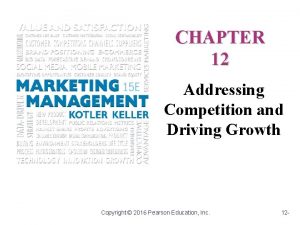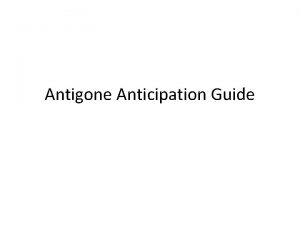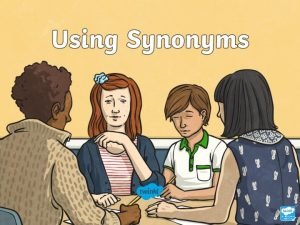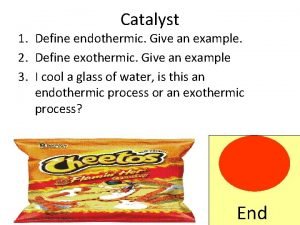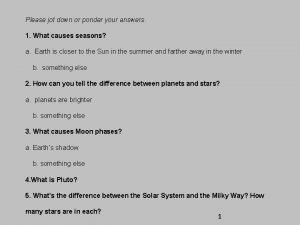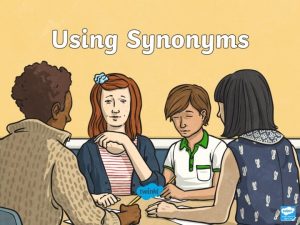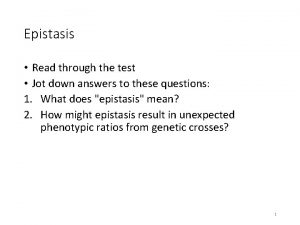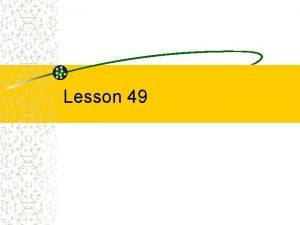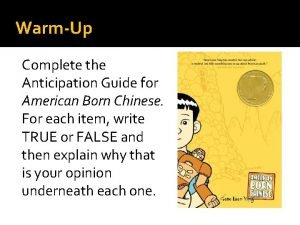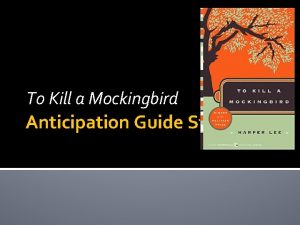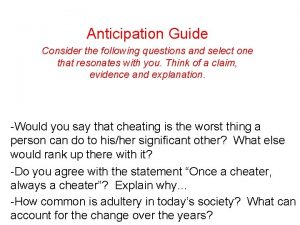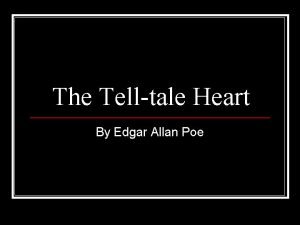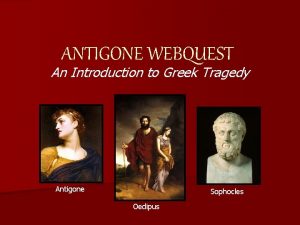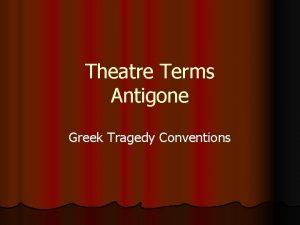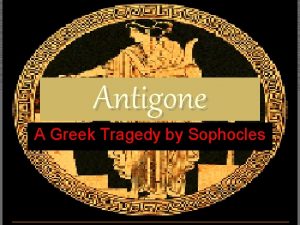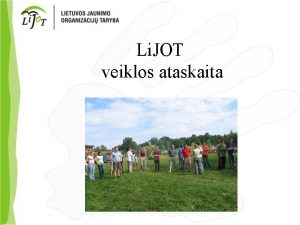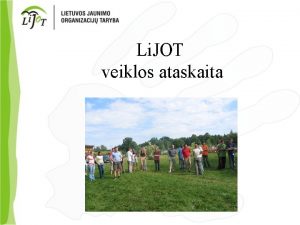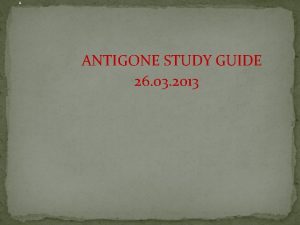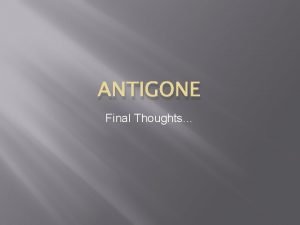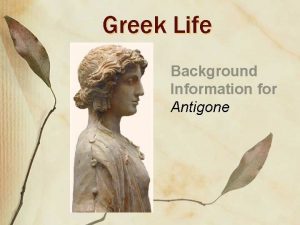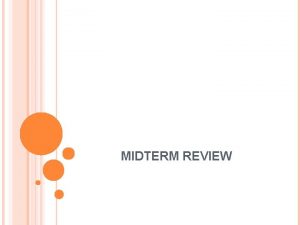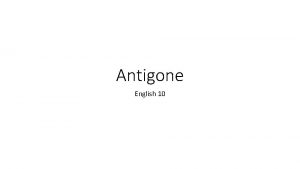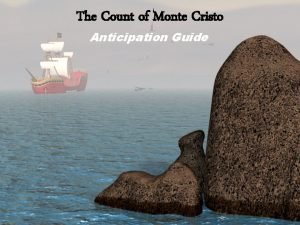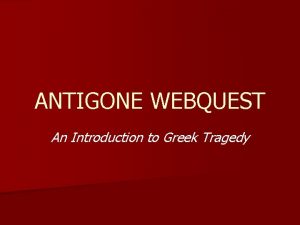Antigone Anticipation What is a tragedy TRAGEDY Jot
























- Slides: 24

Antigone Anticipation What is a tragedy?

TRAGEDY • Jot down your own definition of the word “tragedy. ” • Then, jot down a list of current events you would consider to be tragic.

Dramatic Definition • Tragedy: A person of importance, such as a king or princess, moves from happiness to disaster (and often death) through some character flaw or error in judgment or through the forces of fate.

Respond to the Following Situations: • How loyal do you feel to your family? Why? • If you had to break a serious law for your family, would you? Why? • How do you feel about the death penalty? • Explain your position.

THEATER OF ANCIENT GREECE 800 -400 B. C.

The Dionysian Festival A ritual celebration of the god of harvest, mischief, and plenty. It included ceremonies led by priests that developed into plays. Eventually, this turned into a competition among playwrights.

The Greek Chorus A group of actors who all speak the same thing at the same time. They also usually move in unison. In most plays they represent a kind of divine chorus that explains the meaning of the play to the audience.

Masks served several purposes. • To disguise the actor’s identity (allowed men to play women’s roles, since women were not allowed to act) and allowed them to play more roles (wear more than one mask) • To allow audiences to see the character’s expression at a distance. • To amplify the actor’s voice.

Thespis Thought to be the first “actor” Probably a priest, Thespis stepped out of the chorus and created dialogue between the chorus and a character. Modern day “Thespians” take their name from him.

The Ampitheatre • Outdoor performance space. • No scenery. • No curtains. • Complicated events and all violence occurred off stage.

Skene, Orkestra, Theatron Theater of Dionysus

Sophocles Most famous of the Greek tragedians. He lived during the 5 th Century B. C. He wrote Oedipus Rex, Oedipus at Colonnus, and Antigone. He wrote Antigone in 442 BC (It is the last chronologically, but it was written first. )

The Oedipus Trilogy Part 1: Oedipus the King: The story of how King Oedipus came to banish himself from his own kingdom for a series of crimes he did not know he was committing. Part 2: Oedipus at Colonnus: Oedipus becomes a holy man in the wilderness and is taken up by the gods. Throughout this story, his daughter Antigone takes care of him.

Antigone After Oedipus is exiled, he leaves the ruling rights of Thebes to his two sons, Eteocles and Polynieces, who must take turns to rule. Eteocles rules first but the two become enemies after Eteocles refuses to give up the throne. Polynieces is exiled.

At the beginning of the play… • Both brothers are dead, apparently slain by the other’s hand. • Creon, the current ruler, has made a decree: Since Polynieces fought against Thebes, he shall not be buried. • Meanwhile, Eteocles is buried with full military honors.

What does Antigone do? • Antigone is the daughter of Oedipus and the sister of the dead brothers. She thinks this proclamation is against the gods’ orders. • She confides her plan to bury Polynieces to her sister Ismene. • Ismene is timid, and she refuses to take part in the plan out of fear (though she agrees with the motive. )

Why study Antigone? • Ancient Greek Drama is the basis of all modern drama and film. • The story gives important clues to the Ancient Greek culture and character. • Tragedies still contain the basic elements that they originated with.

Antigone Characters King Creon of Thebes Antigone, his niece Ismene, her sister Haimon, his son Teiresias, a blind prophet Sentry, a soldier Eurydice, the Queen Messenger Chorus

Get ready to read Antigone! A young woman faces a dilemma: • Should she remain loyal to her family and obey the gods…. . or • Should she follow the laws of the government?

Essential Questions: Is it more important to be right than to be happy? Is it our responsibility to rebel against and break and unjust law? What price should a person be willing to pay if he/she breaks an unjust law? Can a leader show uncertainty and maintain leadership?

PERSUASIVE APPEALS: 3 Types Pathos Logos Ethos

Pathos • Pathos appeals rely on emotion and feelings to persuade the audience. • They are often direct, simple, and very powerful.

Logos • Logos appeals rely on the audience’s intelligence (logic) to persuade them. • Education causes audience to be more skeptical of emotional arguments and more receptive to logos.

Ethos • Ethos is a person’s credibility with a given audience. • It can mean sincerity, authority, expertise, faithful, or any adjective that describes someone you can trust to do the right thing. • (Think ethics…)
 Copyright
Copyright Responsive anticipation and creative anticipation
Responsive anticipation and creative anticipation Antigone anticipation guide
Antigone anticipation guide Jot down synonym
Jot down synonym Define endothermic
Define endothermic Jot air balloon
Jot air balloon Please jot down
Please jot down Naczelnik osp wymagania
Naczelnik osp wymagania Jot down synonym
Jot down synonym Recessive epistasis in mice
Recessive epistasis in mice Origins of drama
Origins of drama Shakespeare comedy vs tragedy
Shakespeare comedy vs tragedy Characteristics of tragedy genre
Characteristics of tragedy genre Freak the mighty anticipation guide
Freak the mighty anticipation guide 12 angry men anticipation guide
12 angry men anticipation guide Prinsip dasar animasi yang berguna untuk menunjukkan volume
Prinsip dasar animasi yang berguna untuk menunjukkan volume Anticipation guide for the giver
Anticipation guide for the giver Julius caesar anticipation guide
Julius caesar anticipation guide American born chinese book trailer
American born chinese book trailer Anticipation guide for night by elie wiesel
Anticipation guide for night by elie wiesel To kill a mockingbird anticipation guide
To kill a mockingbird anticipation guide The scarlet letter anticipation guide
The scarlet letter anticipation guide Tell tale heart anticipation guide
Tell tale heart anticipation guide Among the hidden pre reading activities
Among the hidden pre reading activities Allusion in harrison bergeron
Allusion in harrison bergeron
